信息安全作业
信息安全大作业
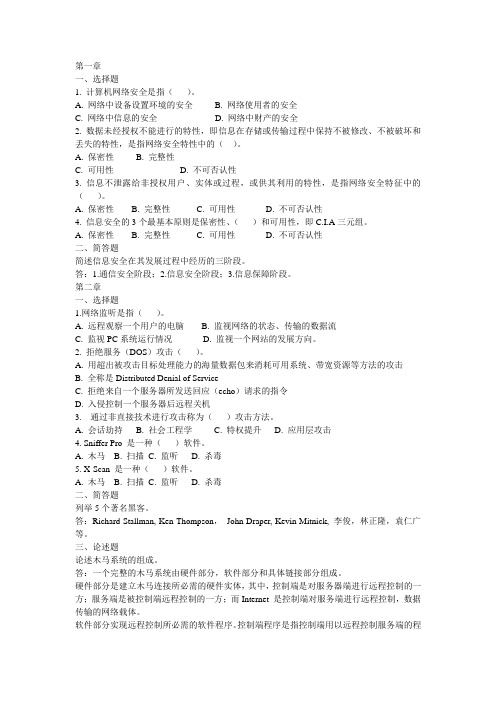
一、选择题
1.数据的加密和解密是对数据进行的某种变换,加密和解密的过程都是在()的控制下进行的。
A.明文B.密文C.信息D.密钥
2.为了避免冒名发送数据或发送后不承认的情况出现,可以采用的办法是()。
A.数字水印B.数字签名C.访问控制D.发电子邮件确认
3.数字签名技术是公开密钥算法的一个典型的应用。在发送端,它采用()对要发送的信息进行数字签名;在接收端,采用()进行签名验证。
3.防火墙采用的最简单的技术是()。
A.安装保护卡B.隔离C.包过滤D.设置进入密码
4.防火墙技术可以分为()3大类型。
A.包过滤、入侵检测和数据加密B.包过滤、入侵检测和应用代理
C.包过滤、应用代理和数据加密D.包过滤、状态检测和应用代理
5.防火墙系统通常由()组成。
A.杀病毒卡和杀病毒软件B.代理服务器和入侵检测系统
H
HIJKLMNOPQRSTUVWXYZABCDEFG
U
UVWXYZABCDEFGHIJKLMNOPQRST
I
IJKLMNOPQRSTUVWXYZABCDEFGH
V
VWXYZABCDEFGHIJKLMNOPQRSTU
J
JKLMNOPQRSTUVWXYZABCDEFGHI
W
WXYZABCDEFGHIJKLMNOPQRSTUV
A.发送者的公钥B.发送者的私钥C.接收者的公钥D.接收者的私钥
4.()是网络通信中标志通信各方身份信息的一系列数据,提供一种在Internet上验证身份的方式。
A.数字认证B.数字证书C.电子证书D.电子认证
5.数字证书采用公钥体制,每个用户设定一把公钥,由本人公开,用它进行()。
A.加密和验证签名B.解密和签名C.加密D.解密
北语20秋《信息安全》作业1【标准答案】

(单选题)1: 操作系统的安全依赖于一些具体实施安全策略的可信的软件和硬件。
这些软件、硬件和负责系统安全管理的人员一起组成了系统的()。
A: 可信计算平台
B: 可信计算机基
C: 可信计算模块
D: 可信计算框架
正确答案: B
(单选题)2: PPTP和L2TP最适合于()。
A: 局域网
B: 企业内部虚拟网
C: 企业扩展虚拟网
D: 远程访问虚拟专用网
正确答案: D
(单选题)3: Windows server 2003系统的安全日志如何设置()。
A: 事件查看器
B: 服务管理器
C: 本地安全策略
D: 网络适配器里
正确答案: C
(单选题)4: DDoS攻击破坏了()。
A: 可用性
B: 保密性
C: 完整性
D: 真实性
正确答案: A
(单选题)5: 下面不属于恶意代码攻击技术的是()
A: 进程注入技术
B: 超级管理技术
C: 端口反向连接技术
D: 自动生产技术
正确答案: D
(单选题)6: 身份鉴别是安全服务中的重要一环,以下关于身份鉴别叙述不正确的是()。
A: 身份鉴别是授权控制的基础
B: 身份鉴别一般不用提供双向的认证
C: 目前一般采用基于对称密钥加密或公开密钥加密的方法
D: 数字签名机制是实现身份鉴别的重要机制
正确答案: B
(单选题)7: 以下关于CA认证中心说法正确的是:()。
北语20秋《信息安全》作业3【标准答案】
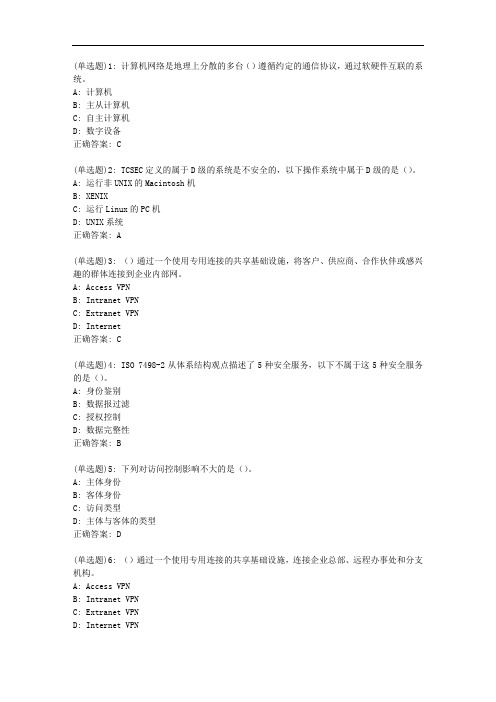
(单选题)1: 计算机网络是地理上分散的多台()遵循约定的通信协议,通过软硬件互联的系统。
A: 计算机
B: 主从计算机
C: 自主计算机
D: 数字设备
正确答案: C
(单选题)2: TCSEC定义的属于D级的系统是不安全的,以下操作系统中属于D级的是()。
A: 运行非UNIX的Macintosh机
B: XENIX
C: 运行Linux的PC机
D: UNIX系统
正确答案: A
(单选题)3: ()通过一个使用专用连接的共享基础设施,将客户、供应商、合作伙伴或感兴趣的群体连接到企业内部网。
A: Access VPN
B: Intranet VPN
C: Extranet VPN
D: Internet
正确答案: C
(单选题)4: ISO 7498-2从体系结构观点描述了5种安全服务,以下不属于这5种安全服务的是()。
A: 身份鉴别
B: 数据报过滤
C: 授权控制
D: 数据完整性
正确答案: B
(单选题)5: 下列对访问控制影响不大的是()。
A: 主体身份
B: 客体身份
C: 访问类型
D: 主体与客体的类型
正确答案: D
(单选题)6: ()通过一个使用专用连接的共享基础设施,连接企业总部、远程办事处和分支机构。
A: Access VPN
B: Intranet VPN
C: Extranet VPN
D: Internet VPN。
(0836)《信息安全》网上作业题及答案
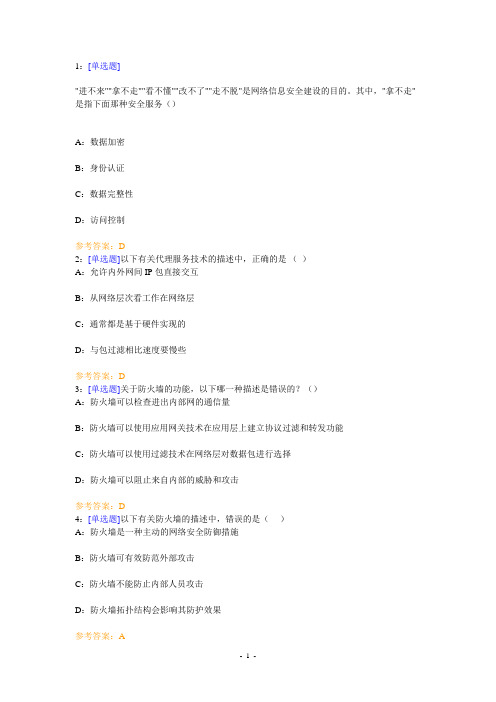
1:[单选题]"进不来""拿不走""看不懂""改不了""走不脱"是网络信息安全建设的目的。
其中,"拿不走"是指下面那种安全服务()A:数据加密B:身份认证C:数据完整性D:访问控制参考答案:D2:[单选题]以下有关代理服务技术的描述中,正确的是()A:允许内外网间IP包直接交互B:从网络层次看工作在网络层C:通常都是基于硬件实现的D:与包过滤相比速度要慢些参考答案:D3:[单选题]关于防火墙的功能,以下哪一种描述是错误的?()A:防火墙可以检查进出内部网的通信量B:防火墙可以使用应用网关技术在应用层上建立协议过滤和转发功能C:防火墙可以使用过滤技术在网络层对数据包进行选择D:防火墙可以阻止来自内部的威胁和攻击参考答案:D4:[单选题]以下有关防火墙的描述中,错误的是()A:防火墙是一种主动的网络安全防御措施B:防火墙可有效防范外部攻击C:防火墙不能防止内部人员攻击D:防火墙拓扑结构会影响其防护效果参考答案:A5:[单选题]以下指标中,可以作为衡量密码算法加密强度的是()A:计算机性能B:密钥个数C:算法保密性D:密钥长度参考答案:D6:[单选题]下面哪一种算法属于对称加密算法()A:DESB:RSAC:ECCD:DSA参考答案:A7:[单选题]下面哪一种算法属于非对称加密算法()A:AESB:RijindaelC:RSAD:DES参考答案:C8:[单选题]以下哪个选项是对称密钥密码体制的特点()A:加解密速度快B:密钥不需传送C:密钥管理容易D:能实现数字签名参考答案:A9:[单选题]以下协议中,哪种协议利用了握手机制来协商加密方式()A:安全RPCB:SOCK5C:SSLD:MD5参考答案:C10:[单选题]一个好的密码体制,其安全性应仅仅依赖于()A:其应用领域B:加密方式的保密性C:算法细节保密性D:密钥的保密性参考答案:D11:[单选题]下列关于密码学作用的描述中,错误的是()A:加密信息,使非授权用户无法知道消息的内容B:消息接收者能通过加解密来确认消息的来源C:消息接收者能通过密码技术来确认消息在传输中是否被改变D:通过密码学可提供完全的安全保障参考答案:D12:[单选题]下面选项中,使用了公钥密码体制的是()A:SSLB:SOCK5C:KerberosD:MD5参考答案:A13:[单选题]公钥密码是()A:对称密钥技术,有1个密钥B:不对称密钥技术,有2个密钥C:对称密钥技术,有2个密钥D:不对称密钥技术,有1个密钥参考答案:B14:[单选题]加密密钥和解密密钥不同,且从其中一个密钥难以推出另一个密钥,这样的系统称为()A:常规加密系统B:单密钥加密系统C:公钥加密系统D:对称加密系统参考答案:C15:[单选题]下列选项中,不属于HASH算法的是()A:ECCB:MD4C:MD5D:SHA参考答案:A16:[单选题]SHA是指以下哪个专用名词的简称?()A:数字签名算法B:数据加密标准C:安全散列算法D:电子数据交换参考答案:C17:[单选题]抵御电子邮箱入侵措施中,不正确的是:()A:不用生日做密码B:不要使用少于5位的密码C:不要使用纯数字D:自己做服务器参考答案:D18:[单选题]密码分析者知道一些消息的密文,并试图恢复尽可能多的明文,进而推导出密钥,这种攻击被称为()A:惟密文攻击B:已知明文攻击C:选择明文攻击D:选择密文攻击参考答案:A19:[单选题]密码分析者不仅知道一些消息的密文,还知道个别密文块对应的明文,试图推导出加密密钥或算法,这种攻击被称为()A:惟密文攻击B:已知明文攻击C:选择明文攻击D:选择密文攻击参考答案:C20:[单选题]以下哪些做法可以增强用户口令的安全性()A:选择由全英文字母组成的口令B:选择由全数字组成的口令C:选择与自己身份相关的口令,以免忘记D:选择无规律的口令参考答案:C21:[单选题]关于屏蔽子网防火墙,下列说法错误的是()A:屏蔽子网防火墙是几种防火墙类型中最安全的B:屏蔽子网防火墙既支持应用级网关也支持电路级网关C:内部网对于Internet来说是不可见的D:内部用户可以不通过DMZ直接访问Internet参考答案:D22:[单选题]在包过滤技术中,不能作为过滤依据的是()A:源IP地址B:传输层协议C:目的端口D:数据内容参考答案:D23:[单选题]以下加密方式中能同时提供保密性和鉴别性的有()A:A用自己私钥加密报文传给BB:A用自己公钥加密报文传给BC:A用B的公钥加密报文传给BD:A用自己私钥加密报文,再用B的公钥加密报文传给B参考答案:D24:[单选题]防毒系统在哪个阶段可以获得病毒入侵报告()A:扩散预防阶段B:快速响应清除阶段C:评估与恢复阶段D:向领导汇报阶段参考答案:C25:[单选题]下列措施中,哪项不是减少病毒的传染和造成的损失的好办法。
直属北语19春《信息安全》作业_1

单选题1(4分) : ()不属于ISO/OSI安全体系结构的安全机制。
A: 通信业务填充机制B: 访问控制机制C: 数字签名机制D: 审计机制2(4分) : VPN的加密手段为()。
A: 具有加密功能的防火墙B: 具有加密功能的路由器C: VPN内的各台主机对各自的信息进行相应的加密D: 单独的加密设备3(4分) : 下面不属于入侵检测分类依据的是()。
A: 物理位置B: 静态配置C: 建模方法D: 时间分析4(4分) : 计算机网络是地理上分散的多台()遵循约定的通信协议,通过软硬件互联的系统。
A: 计算机B: 主从计算机C: 自主计算机D: 数字设备5(4分) : 下面哪个属于对称算法()。
A: 数字签名B: 序列算法C: RSA算法D: 数字水印6(4分) : 电子邮件的发件利用某些特殊的电子邮件软件在短时间内不断重复地将电子邮件寄给同一个收件人,这种破坏方式叫做()。
A: 邮件病毒B: 邮件炸弹C: 特洛伊木马D: 逻辑炸弹7(4分) : 数据备份常用的方式主要有:完全备份、增量备份和()。
A: 逻辑备份B: 按需备份C: 差分备份D: 物理备份8(4分) : “公开密钥密码体制”的含义是()。
A: 将所有密钥公开B: 将私有密钥公开,公开密钥保密C: 将公开密钥公开,私有密钥保密D: 两个密钥相同9(4分) : 操作系统中的每一个实体组件不可能是()。
A: 主体B: 客体C: 既是主体又是客体D: 既不是主体又不是客体10(4分) : 终端服务是Windows操作系统自带的,可以通过图形界面远程操纵服务器。
在默认的情况下,终端服务的端口号是()。
A: 25B: 3389C: 80D: 139911(4分) : ()作用在应用层,其特点是完全“阻隔”网络通信流,通过对每种应用服务编制专门的代理程序,实现监视和控制应用层通信流的作用。
A: 分组过滤防火墙B: 应用代理防火墙C: 状态检查防火墙D: 分组代理防火墙12(4分) : 为了降低风险,不建议使用的Internet服务是()。
北语22秋《信息安全》作业2-学习答案

北语22秋《信息安全》作业2
试卷总分:100 得分:100
一、单选题 (共 10 道试题,共 40 分)
1.密码学的目的是()。
[A.选项]研究数据加密
[B.选项]研究数据解密
[C.选项]研究数据保密
[D.选项]研究信息安全
本题参考选择是:C
2.操作系统中的每一个实体组件不可能是()。
[A.选项]主体
[B.选项]客体
[C.选项]既是主体又是客体
[D.选项]既不是主体又不是客体
本题参考选择是:D
3.下面哪个属于对称算法()。
[A.选项]数字签名
[B.选项]序列算法
[C.选项]RSA算法
[D.选项]数字水印
本题参考选择是:B
4.()不属于ISO/OSI安全体系结构的安全机制。
[A.选项]通信业务填充机制
[B.选项]访问控制机制
[C.选项]数字签名机制
[D.选项]审计机制
本题参考选择是:D
5.IPSec属于()层上的安全机制。
[A.选项]传输层
[B.选项]应用层
[C.选项]数据链路层
[D.选项]网络层
本题参考选择是:D
6.信息安全的基本属性是()。
[A.选项]机密性
[B.选项]可用性
[C.选项]完整性
[D.选项]上面3项都是
本题参考选择是:D。
网络与信息安全网络作业04

网络与信息安全网络作业04咱们现在的生活呀,那可是越来越离不开网络啦!从每天早上一睁眼用手机刷个新闻,到晚上躺床上逛会儿网店,网络就像一个无所不能的魔法盒子,能给咱们变出各种各样想要的东西。
但是呢,你知道吗?这个魔法盒子里也藏着不少危险呢!就说我上次遇到的事儿吧。
我那小侄子,才上小学五年级,天天缠着我要给他玩手机游戏。
我寻思着,玩一会儿也没啥,就给他了。
结果没一会儿,我就听到他在那喊:“姑姑,姑姑,这个游戏说我中奖了,要我填好多信息才能领奖!”我一听,赶紧跑过去看,这一看不得了,明显就是个诈骗信息嘛!我就赶紧跟小侄子说:“宝贝儿,这可不能信,这是骗咱们信息的,要是填了,坏人就知道咱们家好多事儿啦!”小侄子一脸迷茫地看着我,问:“姑姑,那他们怎么知道我在玩这个游戏呀?”我跟他说:“这就是网络的危险之处呀,咱们在网上的一举一动,都有可能被坏人盯上。
”这事儿让我深刻意识到,网络与信息安全太重要啦!特别是对于咱们小学生、中学生还有高中生来说。
咱们先从小学的教材说起。
小学教材里呀,会用一些特别有趣的小故事和小动画,来告诉小朋友们,不能随便在网上跟陌生人聊天,不能轻易把自己的名字、学校、家庭住址这些信息告诉别人。
比如说,有个小故事讲的是小兔子在网上交了个“好朋友”,结果这个“好朋友”居然是个大坏蛋,想要找到小兔子家来欺负它。
小朋友们看了这样的故事,一下子就明白了保护自己信息的重要性。
到了初中呢,教材就更深入一些啦。
会讲到网络的各种原理,比如说IP地址是啥呀,怎么通过网络来传输信息的。
还会教同学们怎么识别一些常见的网络骗局,像那种“免费领手机”“低价卖游戏装备”之类的。
我就听说过一个初中同学,他看到网上有人说免费送手机,只要付一点点邮费就行。
他心动了,就把钱转过去了,结果手机没收到,钱也打了水漂。
这可真是吃了大亏!高中的教材就更厉害啦!会涉及到网络安全的法律法规,还有一些比较高深的技术知识,像加密算法、防火墙这些。
北语网院20春《信息安全》作业_1答案

(单选)1:()不属于ISO/OSI安全体系结构的安全机制。
A:通信业务填充机制
B:访问控制机制
C:数字签名机制
D:审计机制
正确答案:D
(单选)2:下面不属于入侵检测分类依据的是()。
A:物理位置
B:静态配置
C:建模方法
D:时间分析
正确答案:B
(单选)3:数据库管理系统通常提供授权功能来控制不同用户访问数据的权限,这主要是为了实现数据库的()。
A:可靠性
B:一致性
C:完整性
D:安全性
正确答案:D
(单选)4:黑客们在编写编写扰乱社会和他人的计算机程序,这些代码统称为()。
A:恶意代码
B:计算机病毒
C:蠕虫
D:后门
正确答案:A
(单选)5:电子邮件的发件利用某些特殊的电子邮件软件在短时间内不断重复地将电子邮件寄给同一个收件人,这种破坏方式叫做()。
A:邮件病毒
B:邮件炸弹
C:特洛伊木马
D:逻辑炸弹
正确答案:B
(单选)6:攻击者用传输数据来冲击网络接口,使服务器过于繁忙以至于不能应答请求的攻击方式是()。
A:拒绝服务攻击
B:地址欺骗攻击
C:会话劫持
D:信号包探测程序攻击
正确答案:A。
北语23秋《信息安全》作业4-资料答案
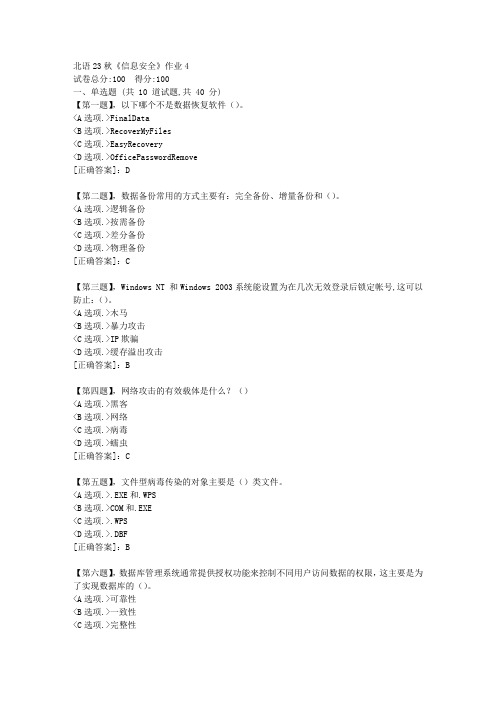
北语23秋《信息安全》作业4试卷总分:100 得分:100一、单选题 (共 10 道试题,共 40 分)【第一题】,以下哪个不是数据恢复软件()。
<A选项.>FinalData<B选项.>RecoverMyFiles<C选项.>EasyRecovery<D选项.>OfficePasswordRemove[正确答案]:D【第二题】,数据备份常用的方式主要有:完全备份、增量备份和()。
<A选项.>逻辑备份<B选项.>按需备份<C选项.>差分备份<D选项.>物理备份[正确答案]:C【第三题】,Windows NT 和Windows 2003系统能设置为在几次无效登录后锁定帐号,这可以防止:()。
<A选项.>木马<B选项.>暴力攻击<C选项.>IP欺骗<D选项.>缓存溢出攻击[正确答案]:B【第四题】,网络攻击的有效载体是什么?()<A选项.>黑客<B选项.>网络<C选项.>病毒<D选项.>蠕虫[正确答案]:C【第五题】,文件型病毒传染的对象主要是()类文件。
<A选项.>.EXE和.WPS<B选项.>COM和.EXE<C选项.>.WPS<D选项.>.DBF[正确答案]:B【第六题】,数据库管理系统通常提供授权功能来控制不同用户访问数据的权限,这主要是为了实现数据库的()。
<A选项.>可靠性<B选项.>一致性<C选项.>完整性。
信息安全技术应用作业指导书

信息安全技术应用作业指导书一、背景介绍如今,随着信息技术的快速发展和普及应用,信息安全问题也逐渐引起了广泛关注。
为了保护个人和组织的信息资产安全,信息安全技术应运而生。
本作业指导书旨在帮助学习者理解信息安全技术的基本概念和应用场景,并指导其进行相关作业。
二、信息安全技术介绍1. 定义和目标信息安全技术是指通过采取一系列的技术手段和方法,保护信息系统及其所处理的信息免遭未授权访问、非法窃取、篡改、破坏或滥用的技术手段和方法。
其目标是确保信息的机密性、完整性、可用性和可靠性。
2. 基本原理信息安全技术基于多个基本原理,包括但不限于:- 机密性:保护信息不被未经授权的个人或系统访问;- 完整性:保护信息在传输、存储、处理过程中不被篡改;- 可用性:确保信息系统和数据及时可用,防止服务中断或不可用;- 认证和授权:确保用户身份的真实性并分配适当的访问权限;- 防护和检测:采用防火墙、入侵检测系统等技术手段保护系统免受攻击。
3. 应用场景信息安全技术的应用场景广泛,包括但不限于以下几个方面:- 网络安全:保护网络系统和通信不受攻击,防止黑客入侵和数据泄露;- 数据安全:确保数据的完整性和保密性,避免数据泄露和篡改;- 身份认证:验证用户身份的真实性,以防止未授权的访问;- 加密技术:将信息进行加密以保护其机密性;- 安全管理和风险评估:建立安全策略、指导和标准,并评估和管理风险。
三、作业指导在完成信息安全技术应用作业时,建议学习者按以下步骤进行:1. 确定需求:明确作业要求,了解需要保护的信息内容和关键要素。
2. 风险评估:对信息安全风险进行评估,找出可能存在的威胁和漏洞。
3. 选择合适的安全技术:根据需求和风险评估结果,选择合适的信息安全技术进行应用。
例如,如果需要保护网络安全,可以使用防火墙、入侵检测系统等技术手段。
4. 实施安全措施:按照所选择的安全技术和方案,对信息系统进行安全配置、加密处理等操作。
信息安全技术大作业

信息安全技术大作业标题:信息安全技术大作业——保护企业数据的重要措施在当今数字化快速发展的时代,信息安全的保护已经成为各行业,尤其是企业的首要任务。
企业数据泄露事件频发,既造成了重大的经济损失,也严重影响了企业的声誉和客户信任。
因此,建立和完善信息安全保护机制,是现代企业可持续发展的关键。
一、防火墙与入侵检测系统(IDS)防火墙是防御网络攻击的第一道防线,它可以限制未授权访问,防止非法用户进入内部网络。
而入侵检测系统(IDS)则是一种能够实时监控网络或系统的安全软件,可以检测并报告未授权的活动,从而帮助管理员及时做出反应,阻止可能的攻击。
二、数据加密数据加密是一种防止数据泄露的有效手段。
通过加密,即使数据被窃取,攻击者也无法解读。
数据加密的方法有很多种,包括对称加密(如AES)、非对称加密(如RSA)以及公钥基础设施(PKI)等。
三、备份与恢复策略无论安全措施如何完善,也不能保证100%避免数据丢失。
因此,制定一个有效的备份与恢复策略至关重要。
企业应定期备份所有数据,并存储在安全的地方,以防止数据丢失。
此外,如果发生重大安全事件,应有能力快速恢复数据,以减少可能的损失。
四、员工培训尽管有先进的技术可以保护企业的信息安全,但人为因素仍然是一个主要的威胁。
因此,企业需要定期对员工进行信息安全培训,提高他们的信息安全意识,防止内部数据泄露。
五、定期安全审计定期的安全审计可以帮助企业评估当前的安全措施是否有效,发现可能存在的安全隐患,并及时采取补救措施。
这是一个有效提高企业信息安全水平的方法。
总的来说,信息安全是企业的生命线,任何的疏忽都可能导致无法挽回的后果。
因此,企业必须采取有效的信息安全技术,建立完善的安全管理制度,加强员工培训,定期进行安全审计,以确保企业信息安全,维护企业稳定和可持续发展。
信息安全与技术信息安全与技术在当今高度信息化的时代,信息安全与技术已经成为我们生活和工作中不可或缺的重要因素。
北语20新上《信息安全》作业3答案

(单选题)1: 计算机病毒是计算机系统中一类隐藏在()上蓄意破坏的捣乱程序。
A: 内存
B: 软盘
C: 存储介质
D: 网络
正确答案: C
(单选题)2: 计算机网络是地理上分散的多台()遵循约定的通信协议,通过软硬件互联的系统。
A: 计算机
B: 主从计算机
C: 自主计算机
D: 数字设备
正确答案: C
(单选题)3: 下面不属于DoS攻击的是()。
A: Smurf攻击
B: Ping of Deatch
C: Land攻击
D: TFN攻击
正确答案: D
(单选题)4: 电子邮件的发件利用某些特殊的电子邮件软件在短时间内不断重复地将电子邮件寄给同一个收件人,这种破坏方式叫做()。
A: 邮件病毒
B: 邮件炸弹
C: 特洛伊木马
D: 逻辑炸弹
正确答案: B
(单选题)5: 凡是基于网络应用的程序都离不开()。
A: Scoket
B: Winsock
C: 注册表
D: MFC编程
正确答案: A
(单选题)6: 拒绝服务攻击的后果是()。
A: 信息不可用
B: 应用程序不可用
C: 系统宕机
D: 上面几项都是
正确答案: D。
北语16秋《信息安全》作业1
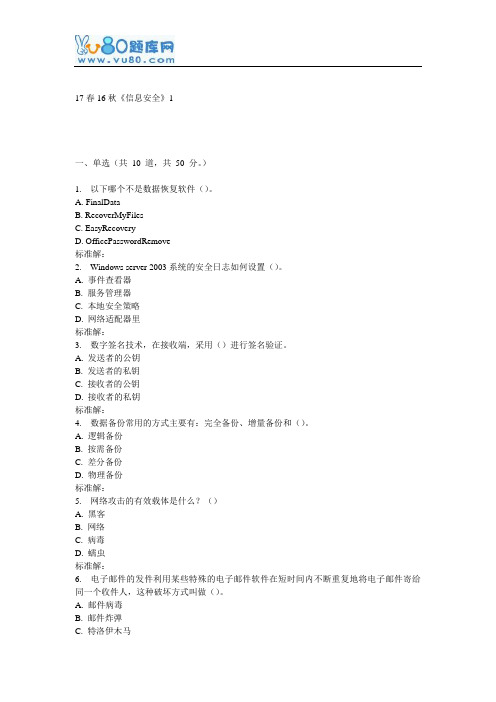
17春16秋《信息安全》1一、单选(共10 道,共50 分。
)1. 以下哪个不是数据恢复软件()。
A. FinalDataB. RecoverMyFilesC. EasyRecoveryD. OfficePasswordRemove标准解:2. Windows server 2003系统的安全日志如何设置()。
A. 事件查看器B. 服务管理器C. 本地安全策略D. 网络适配器里标准解:3. 数字签名技术,在接收端,采用()进行签名验证。
A. 发送者的公钥B. 发送者的私钥C. 接收者的公钥D. 接收者的私钥标准解:4. 数据备份常用的方式主要有:完全备份、增量备份和()。
A. 逻辑备份B. 按需备份C. 差分备份D. 物理备份标准解:5. 网络攻击的有效载体是什么?()A. 黑客B. 网络C. 病毒D. 蠕虫标准解:6. 电子邮件的发件利用某些特殊的电子邮件软件在短时间内不断重复地将电子邮件寄给同一个收件人,这种破坏方式叫做()。
A. 邮件病毒B. 邮件炸弹C. 特洛伊木马D. 逻辑炸弹标准解:7. DDoS攻击破坏了()。
A. 可用性B. 保密性C. 完整性D. 真实性标准解:8. Windows NT 和Windows 2003系统能设置为在几次无效登录后锁定帐号,这可以防止:()。
A. 木马B. 暴力攻击C. IP欺骗D. 缓存溢出攻击标准解:9. ()分析法实际上是一个模板匹配操作,匹配的一方是系统设置情况和用户操作动作,一方是已知攻击的签名数据库。
A. 签名分析法B. 统计分析法C. 数据完整性分析法D. 以上都正确标准解:10. 有关数字签名的作用,哪一点不正确。
()A. 唯一地确定签名人的身份B. 对签名后信件的内容是否又发生变化进行验证C. 发信人无法对信件的内容进行抵赖D. 权威性标准解:16秋《信息安全》1二、判断(共10 道,共50 分。
)1. 加密算法的安全强度取决于密钥的长度。
北语16秋《信息安全》作业3
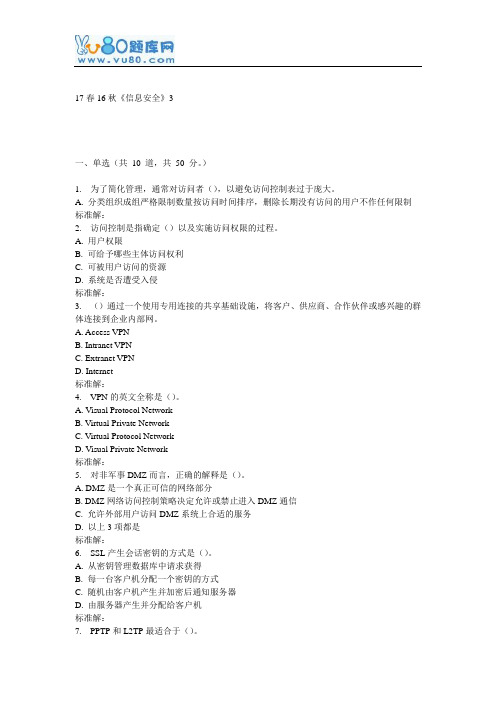
17春16秋《信息安全》3一、单选(共10 道,共50 分。
)1. 为了简化管理,通常对访问者(),以避免访问控制表过于庞大。
A. 分类组织成组严格限制数量按访问时间排序,删除长期没有访问的用户不作任何限制标准解:2. 访问控制是指确定()以及实施访问权限的过程。
A. 用户权限B. 可给予哪些主体访问权利C. 可被用户访问的资源D. 系统是否遭受入侵标准解:3. ()通过一个使用专用连接的共享基础设施,将客户、供应商、合作伙伴或感兴趣的群体连接到企业内部网。
A. Access VPNB. Intranet VPNC. Extranet VPND. Internet标准解:4. VPN的英文全称是()。
A. Visual Protocol NetworkB. Virtual Private NetworkC. Virtual Protocol NetworkD. Visual Private Network标准解:5. 对非军事DMZ而言,正确的解释是()。
A. DMZ是一个真正可信的网络部分B. DMZ网络访问控制策略决定允许或禁止进入DMZ通信C. 允许外部用户访问DMZ系统上合适的服务D. 以上3项都是标准解:6. SSL产生会话密钥的方式是()。
A. 从密钥管理数据库中请求获得B. 每一台客户机分配一个密钥的方式C. 随机由客户机产生并加密后通知服务器D. 由服务器产生并分配给客户机标准解:7. PPTP和L2TP最适合于()。
B. 企业内部虚拟网C. 企业扩展虚拟网D. 远程访问虚拟专用网标准解:8. VPN的加密手段为()。
A. 具有加密功能的防火墙B. 具有加密功能的路由器C. VPN内的各台主机对各自的信息进行相应的加密D. 单独的加密设备标准解:9. PKI支持的服务不包括()。
A. 非对称密钥技术及证书管理B. 目录服务C. 对称密钥的产生和分发D. 访问控制服务标准解:10. 下列对访问控制影响不大的是()。
(完整版)信息安全系统在线作业

您的本次作业分数为:89分单选题1.【第11、12章】通常为保证信息处理对象的认证性采用的手段是(____)。
• A 信息加密和解密• B 信息隐匿• C 数字签名和身份认证技术• D 数字水印•单选题2.【第11、12章】计算机病毒最重要的特征是(____)。
• A 隐蔽性• B 传染性• C 潜伏性• D 表现性•单选题3.【第11、12章】不能防止计算机感染病毒的措施是(____)。
• A 定时备份重要文件• B 经常更新操作系统• C 除非确切知道附件内容,否则不要打开电子邮件附件• D 重要部门的计算机尽量专机专用,与外界隔绝•单选题4.【第11、12章】某病毒利用RPCDCOM缓冲区溢出漏洞进行传播,病毒运行后,在%System%文件夹下生成自身的拷贝nvchip4、exe,添加注册表项,使得自身能够在系统启动时自动运行。
通过以上描述可以判断这种病毒的类型为(____)。
• A 文件型病毒• B 宏病毒• C 网络蠕虫病毒• D 特洛伊木马病毒•单选题5.【第11、12章】计算机病毒的实时监控属于(____)类的技术措施。
• A 保护• B 检测• C 响应• D 恢复•单选题6.【第11、12章】安全扫描可以(____)。
• A 弥补由于认证机制薄弱带来的问题• B 弥补由于协议本身而产生的问题• C 弥补防火墙对内网安全威胁检测不足的问题• D 扫描检测所有的数据包攻击,分析所有的数据流•单选题7.【第11、12章】在目前的信息网络中,(____)病毒是最主要的病毒类型。
• A 引导型• B 文件型• C 网络蠕虫• D 木马型•单选题8.【第11、12章】传统的文件型病毒以计算机操作系统作为攻击对象,而现在越来越多的网络蠕虫病毒将攻击范围扩大到了(____)等重要网络资源。
• A 网络带宽• B 数据包• C 防火墙• D LINUX•单选题9.【第11、12章】相对于现有杀毒软件在终端系统中提供保护不同,(____)在内外网络边界处提供更加主动和积极的病毒保护。
信息安全的作业标准

信息安全的作业标准随着信息技术的迅猛发展,信息安全问题日益突出。
在互联网时代,各种信息被广泛传播,但同时也面临着被黑客攻击、数据泄露等风险。
为了保护信息安全,各个行业都需要制定相应的作业标准。
一、信息安全意识培养信息安全的第一步是培养员工的安全意识。
公司应该定期组织员工参加信息安全培训,提高他们对信息安全的认识和理解。
通过培训,员工可以学习到如何识别和防范各种安全威胁,以及如何正确使用各种安全工具和技术。
二、密码管理密码是保护个人和企业信息安全的重要手段。
因此,制定密码管理标准是必不可少的。
密码应该具备一定的复杂性,包括大小写字母、数字和特殊字符,并且定期更换密码。
此外,密码不应该以明文形式存储,而是应该进行加密处理,确保安全性。
三、网络安全防护网络安全是信息安全的重要组成部分。
公司应该建立完善的网络安全防护措施,包括防火墙、入侵检测系统、反病毒软件等。
同时,定期进行网络安全漏洞扫描和安全评估,及时修补漏洞,确保网络的安全性。
四、数据备份与恢复数据备份是防范数据丢失的重要手段。
公司应该制定数据备份和恢复的标准,包括备份的频率、备份的存储位置等。
同时,还需要定期进行数据恢复测试,确保备份的可靠性和完整性。
五、物理安全保障除了网络安全,物理安全也是信息安全的重要方面。
公司应该制定相应的物理安全保障标准,包括门禁系统、监控系统等。
同时,重要设备和存储介质应该进行合理的保管,确保不被盗窃或损坏。
六、应急响应与漏洞修复即使做了充分的安全防护,也不能保证绝对的安全。
因此,公司应该制定应急响应和漏洞修复的标准。
一旦发生安全事件,公司应该立即采取相应的措施,包括隔离受影响的系统、收集证据等。
同时,对于已知的漏洞,公司应该及时修复,避免被黑客利用。
七、合规与监管信息安全的作业标准还应该符合相关的法规和规定。
公司应该制定合规与监管的标准,包括对个人信息的保护、对敏感数据的处理等。
同时,定期进行内部和外部的安全审计,确保公司的信息安全工作符合法规要求。
A10消费者信息安全意识培养作业1-信息安全意识培养作业
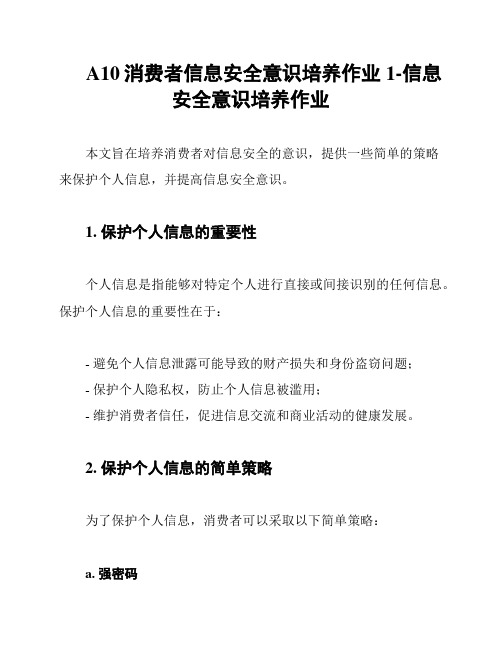
A10消费者信息安全意识培养作业1-信息安全意识培养作业本文旨在培养消费者对信息安全的意识,提供一些简单的策略来保护个人信息,并提高信息安全意识。
1. 保护个人信息的重要性个人信息是指能够对特定个人进行直接或间接识别的任何信息。
保护个人信息的重要性在于:- 避免个人信息泄露可能导致的财产损失和身份盗窃问题;- 保护个人隐私权,防止个人信息被滥用;- 维护消费者信任,促进信息交流和商业活动的健康发展。
2. 保护个人信息的简单策略为了保护个人信息,消费者可以采取以下简单策略:a. 强密码设置强密码是保护个人信息的一种基本策略。
密码应该是长且复杂的组合,包括字母、数字和符号,且不易猜测。
同时,每个网站或应用程序都应设置独特的密码,避免使用相同的密码。
b. 谨慎分享个人信息在互联网上,消费者应该谨慎分享个人信息。
只在可信的网站上输入个人信息,并避免在公共场所或公共网络中使用个人敏感信息。
c. 审查隐私设置消费者应密切关注各个平台和应用程序的隐私设置,确保个人信息得到适当的保护。
限制个人信息的可见范围,仅与可信任的联系人分享信息。
d. 警惕网络钓鱼和恶意软件e. 定期检查个人信息消费者应定期检查个人信息是否遭受泄露或滥用。
如发现异常情况,应及时采取措施保护个人信息,并向相关机构报告。
3. 提高信息安全意识的重要性提高信息安全意识对消费者来说非常重要,它能帮助消费者更好地保护个人信息,减少信息泄露的风险。
提高信息安全意识的方法包括:- 参加信息安全培训和教育活动;- 关注信息安全新闻和更新的漏洞消息;- 建立健康的网络使用惯;- 了解常见的网络诈骗手段和防范措施。
结论个人信息安全是每个消费者都应关注的重要问题。
通过采取简单的策略和提高信息安全意识,消费者可以更好地保护个人信息,避免潜在的风险和损失。
同时,持续关注信息安全领域的最新动态,不断提升自己的信息安全意识和技能。
信息技术作业信息安全的保障与防范措施
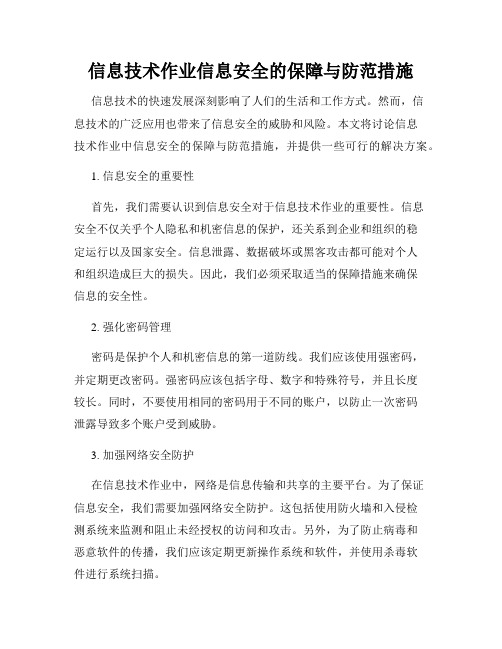
信息技术作业信息安全的保障与防范措施信息技术的快速发展深刻影响了人们的生活和工作方式。
然而,信息技术的广泛应用也带来了信息安全的威胁和风险。
本文将讨论信息技术作业中信息安全的保障与防范措施,并提供一些可行的解决方案。
1. 信息安全的重要性首先,我们需要认识到信息安全对于信息技术作业的重要性。
信息安全不仅关乎个人隐私和机密信息的保护,还关系到企业和组织的稳定运行以及国家安全。
信息泄露、数据破坏或黑客攻击都可能对个人和组织造成巨大的损失。
因此,我们必须采取适当的保障措施来确保信息的安全性。
2. 强化密码管理密码是保护个人和机密信息的第一道防线。
我们应该使用强密码,并定期更改密码。
强密码应该包括字母、数字和特殊符号,并且长度较长。
同时,不要使用相同的密码用于不同的账户,以防止一次密码泄露导致多个账户受到威胁。
3. 加强网络安全防护在信息技术作业中,网络是信息传输和共享的主要平台。
为了保证信息安全,我们需要加强网络安全防护。
这包括使用防火墙和入侵检测系统来监测和阻止未经授权的访问和攻击。
另外,为了防止病毒和恶意软件的传播,我们应该定期更新操作系统和软件,并使用杀毒软件进行系统扫描。
4. 数据备份与恢复数据的丢失或损坏可能导致严重的后果。
因此,我们应该定期备份重要的数据,并将其存储在安全的地方。
在数据丢失或损坏的情况下,我们可以通过备份数据来恢复丢失的信息,减少损失。
5. 员工培训与意识提高无论采取多么严格的安全措施,人为因素仍然是信息泄露的主要原因之一。
因此,对员工进行信息安全培训是至关重要的。
培训内容可以包括如何识别和避免网络钓鱼、如何处理敏感信息以及如何正确使用密码等。
通过提高员工的信息安全意识,可以降低信息泄露和攻击的风险。
6. 定期安全审查与漏洞修复定期进行安全审查可以帮助我们及时发现和修复系统的漏洞和安全隐患。
安全审查可以包括对系统配置和权限的检查,对网络和应用程序的安全性进行评估,以及对安全策略和流程的审查。
网络信息安全在线作业
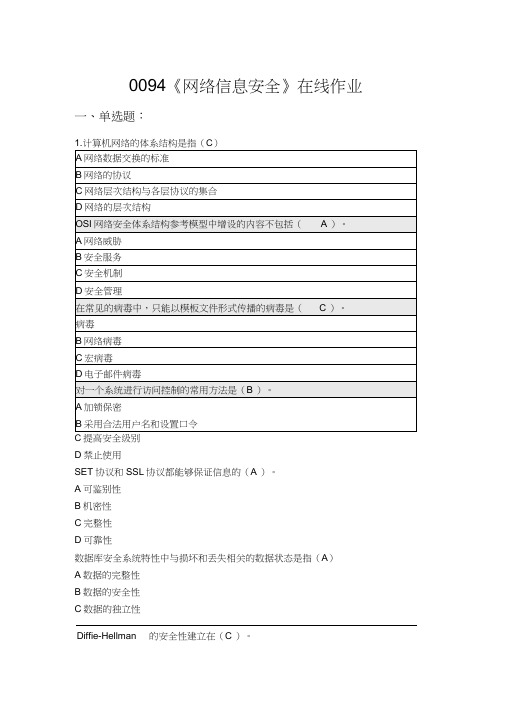
0094《网络信息安全》在线作业一、单选题:C提高安全级别D禁止使用SET协议和SSL协议都能够保证信息的(A )。
A可鉴别性B机密性C完整性D可靠性数据库安全系统特性中与损坏和丢失相关的数据状态是指(A)A数据的完整性B数据的安全性C数据的独立性Diffie-Hellman 的安全性建立在(C )。
D数据的可用性Diffie-Hellman 的安全性建立在(C )。
、多选题三、简答题: 计算机网络安全的关键技术主要有哪些答: 计算机网络安全主要有以下关键技术:1、虚拟网技术,主要基于近年发展的局域网交换技术(ATM和以太网交换)。
交换技术将传统的基于广播的局域网技术发展为面向连接的技术。
2、防火墙枝术,是一种用来加强网络之间访问控制,防止外部网络用户以非法手段通过外部网络进入内部网络,访问内部网络资源,保护内部网络操作环境的特殊网络互联设备。
3、病毒防护技术,病毒历来是信息系统安全的主要问题之一。
由于网络的广泛互联,病毒的传播途径和速度大大加快。
4、入侵检测技术,利用防火墙技术,经过仔细的配置,通常能够在内外网之间提供安全的网络保护,降低了网络安全风险。
5、安全扫描技术,网络安全技术中,另一类重要技术为安全扫描技术。
安全扫描技术与防火墙、安全监控系统互相配合能够提供很高安全性的网络。
6、认证和数宇签名技术,认证技术主要解决网络通讯过程中通讯双方的身份认可,数字签名作为身份认证技术中的一种具体技术,同时数字签名还可用于通信过程中的不可抵赖要求的实现。
7、VPN技术以及应用系统的安全技术。
四、论述题: 简述入侵检测的过程。
答: 入侵检测包括以下过程:1 、系统整体安全分析分析用户的网络拓扑结构,以找出其结构性及网络配置上存在的安全隐患。
通过考察用户信息设备的设置场地,以使得设备物理上是安全的。
分析用户信息系统的管理、使用流程,以使得系统能够安全地管理、安全地使用。
2、主机系统安全检测通过对主机进行安全扫描,以发现系统的常见的安全漏洞。
- 1、下载文档前请自行甄别文档内容的完整性,平台不提供额外的编辑、内容补充、找答案等附加服务。
- 2、"仅部分预览"的文档,不可在线预览部分如存在完整性等问题,可反馈申请退款(可完整预览的文档不适用该条件!)。
- 3、如文档侵犯您的权益,请联系客服反馈,我们会尽快为您处理(人工客服工作时间:9:00-18:30)。
Online Bank SecurityWhile the internet offers enormous advantages and opportunities, it also presents various security risks. With this in mind, banks take extensive steps to protect the information transmitted and processed when banking online. This includes, for example, ensuring that confidential data sent over the internet cannot be accessed or modified by unauthorised third parties.But the banks normally have no influence over the systems used by their customers. The choice is entirely up to them. Moreover, the system selected - a PC connected to the internet, for example - will usually be used for a number of other applications as well.The systems used by online banking customers are therefore exposed to risks beyond the banks' control. For this reason, the banks cannot assume liability for them.Typical dangers faced when using the internet are third parties accessing, deleting or tampering with data while it is being transmitted or obtaining information under false pretences. This may be achieved with the help of viruses and worms: programmes that self-replicate or are sent over the internet by e-mail and can damage your PC;Trojans: programmes that, unbeknown to the user, compromise computer security by intercepting passwords, for example; phishing: using a false name, website or address for fraudulent purposes; pharming: redirecting users to a fraudulent server; rootkits: malicious software giving unauthorised administrator-level access without the real administrator noticing; they share certain features with trojans; hacking: unauthorised access to a PC via the internet.The banks have a number of measures in place that offer effective protection against attacks when information is sent over the internet or processed by the bank's server.What can customers do?To ensure that the banks' security measures cannot be undermined by manipulation, it is essential that customers, too, take steps to protect the system theyuse. These include being security-conscious when using the internet and checking bank statements regularly. Naturally, dangers are not lurking everywhere in cyberspace. Not everyone online bankers come into contact with wants to, or will, do them harm. Just by following the ten rules outlined below, customers can significantly improve the security of their PC and reduce the risks of using the internet to an absolute minimum. Should customers nevertheless suspect that they have come across internet fraudsters, they should ensure that access to their online account is blocked immediately and report any irregularities to their bank without delay. All relevant information should be saved so that the attempt at fraud can be traced. This means that the hard drive should not be formatted immediately.It is highly important for people who use computers to maintain backup files regardless of whether or not they bank online. It is usually extremely difficult, if not impossible, to salvage data once it has been deleted or corrupted. A convenient way of making backups is to save the data on a removable hard drive, a CD or DVD writer. Whatever method is chosen, it is essential to save revised or new data on a regular basis.Security ruleInstall security software(including an up-to-date virus scanner)Install additional security software. Some security problems cannot be solved with your operating system's standard tools alone. An important additional tool is an efficient virus scanner that is continuously updated online and thus able to detect new viruses. New viruses are being discovered almost every day and it is quite possible to become infected while surfing the net.Remember that, as long as you are online, third parties can build up a picture of what information is on your PC because your computer has its own address on the web and can thus be accessed from outside.If you do not have adequate security in place, you run the risk of unauthorised persons gaining access to data (e.g. PINs and TANs, which, incidentally, should never be saved) by means of surreptitiously installed spyware applications. These can gathersensitive data without your knowledge, such as account information and passwords, or even record your keystrokes. The data is then sent to an unknown e-mail address or server. Spyware programmes may be hidden in internet pages, e-mails or e-mail attachments and are therefore sometimes also called Trojan horses. Malicious software which particularly targets core functions of the operating system is also known as rootkit; the dividing line between the two is blurred. As soon as an infected programme is opened, the spyware will install itself on your computer without your knowledge. So delete suspicious e-mails without opening them. Don't open any suspicious attachments, even if they appear to come from a familiar address. Deactivate your e-mail client's auto-preview function to avoid e-mails being opened automatically. A personal firewall can protect you from such attacks. A firewall is a programme that monitors all incoming and outgoing traffic between your PC and the internet and permits only familiar or authorised connections.Computer stores also offer a wide range of other programmes that can help to improve the security of your PC, such as access protection and encryption devices. Keep abreast of any new security threats on the internet and of the steps you can take to protect yourself from them. You will find information about banking online safely on your bank's website.。
